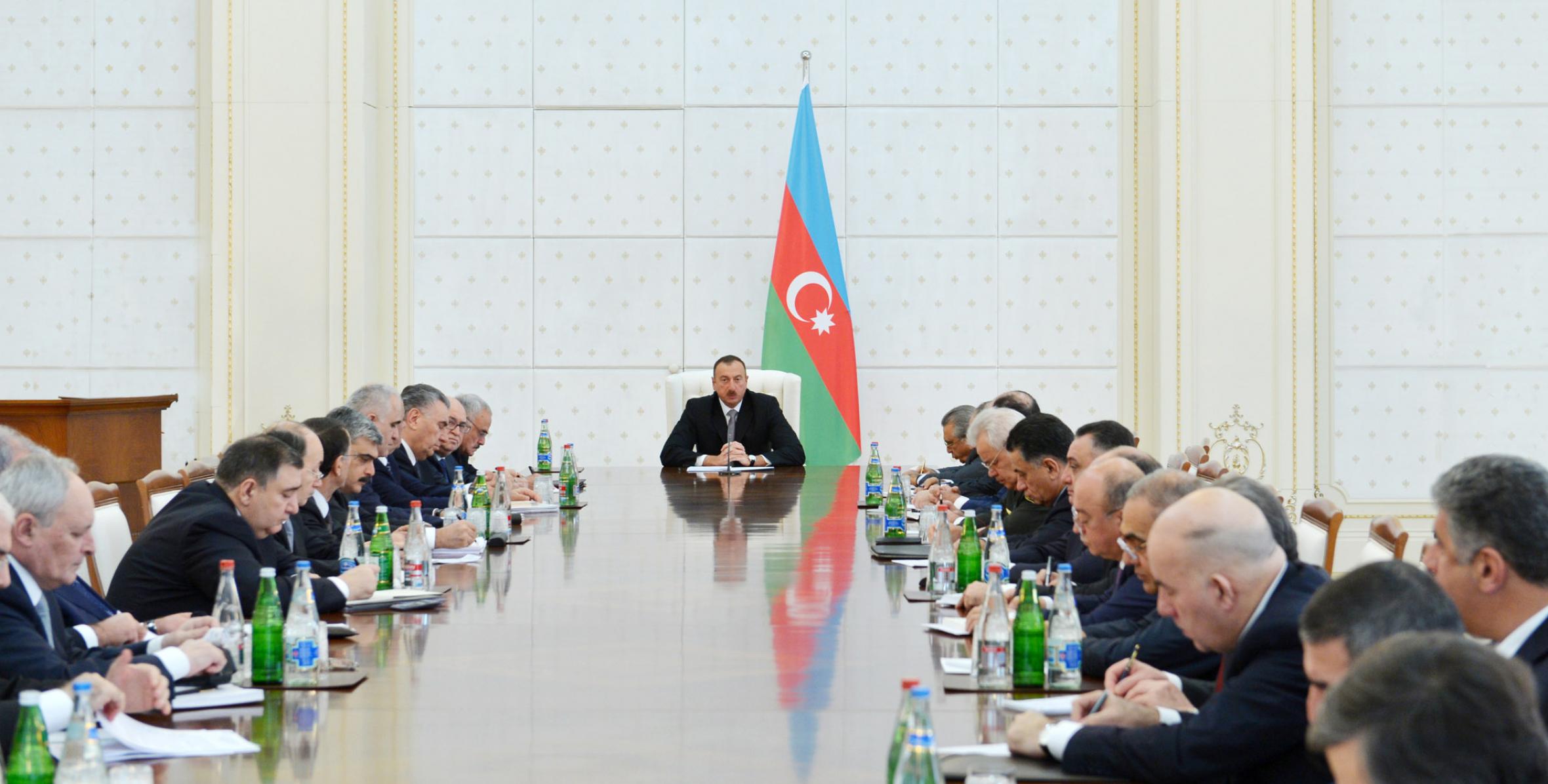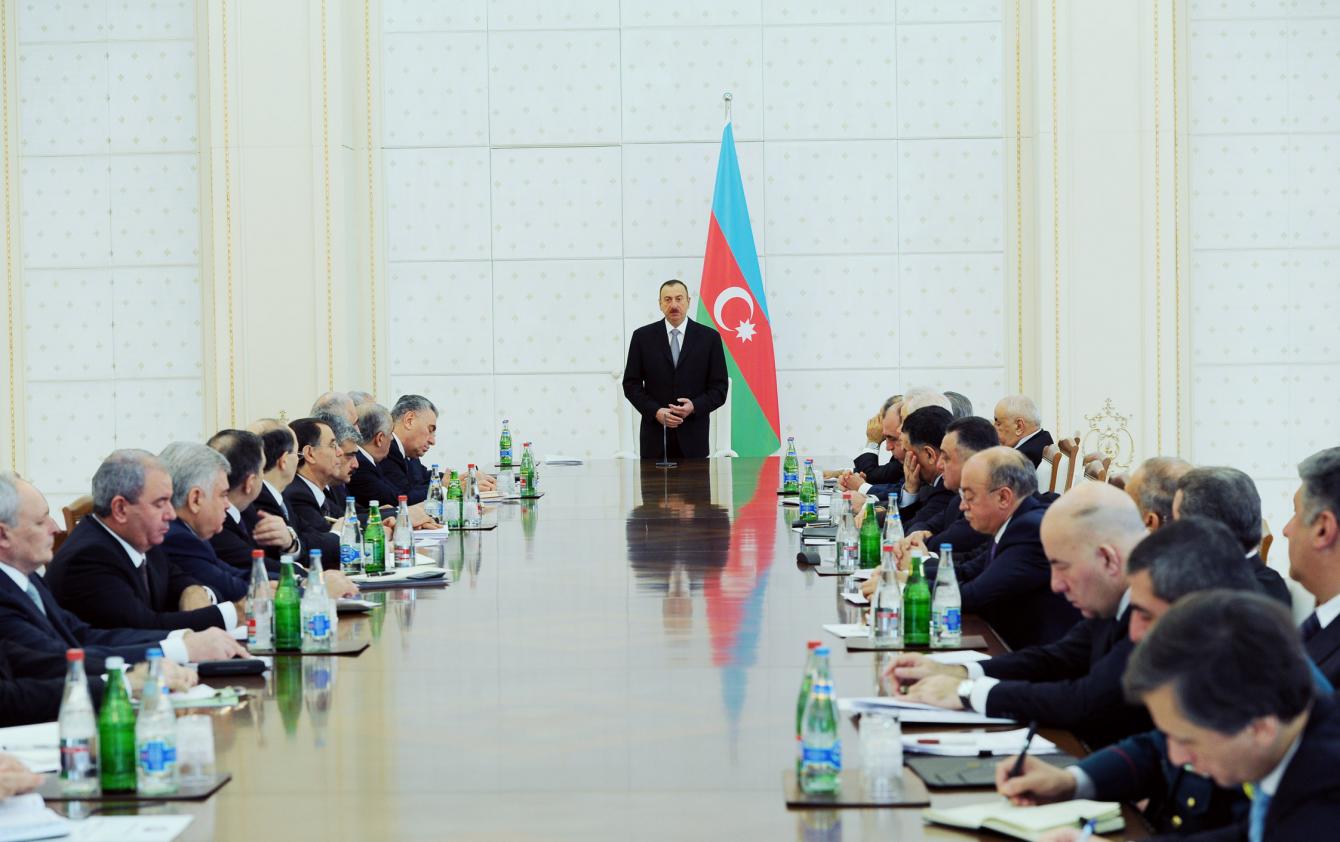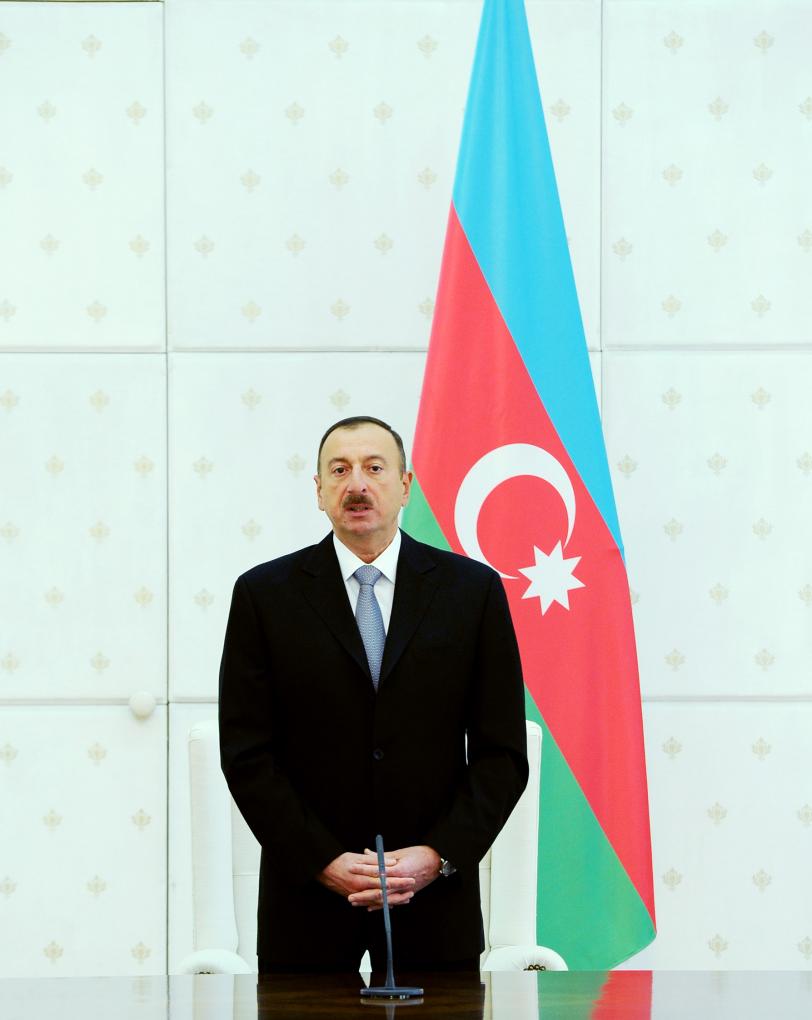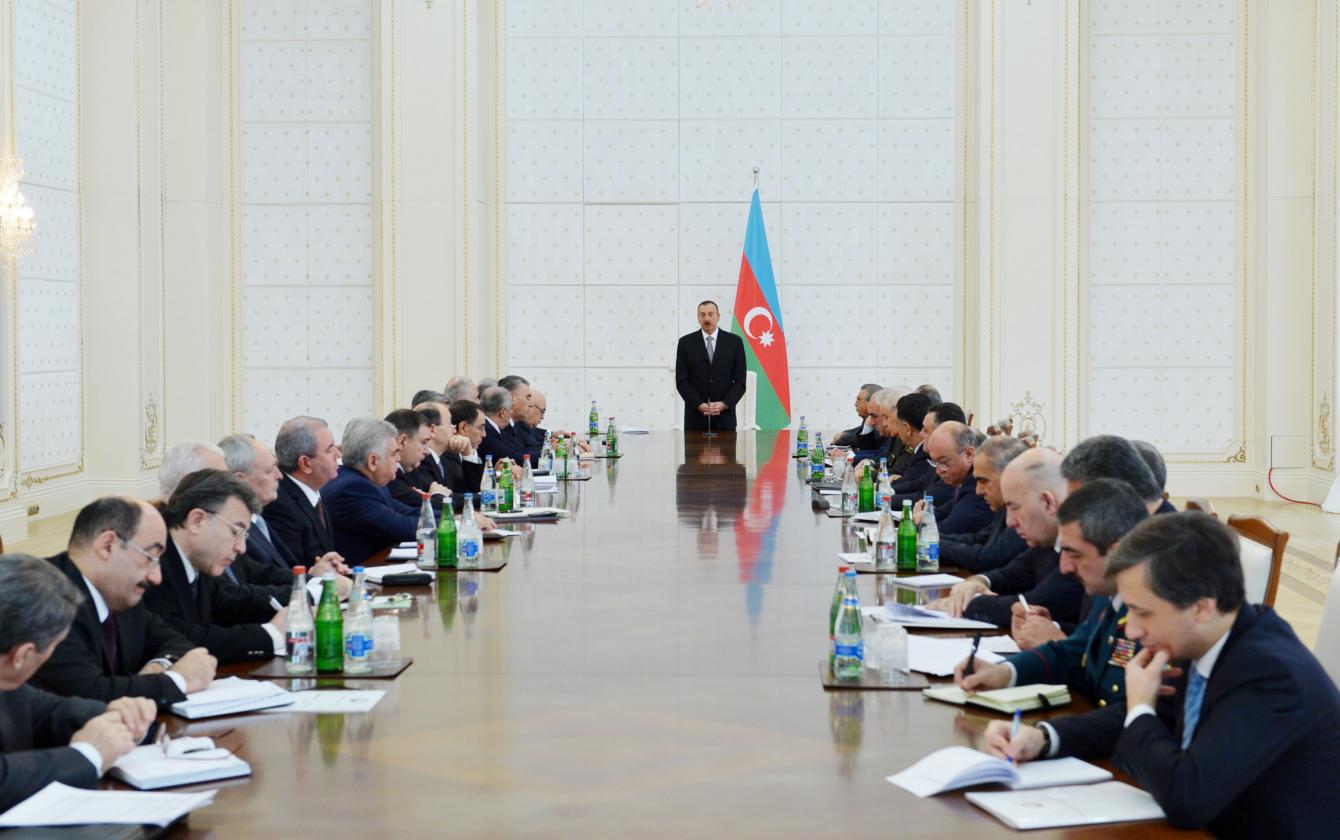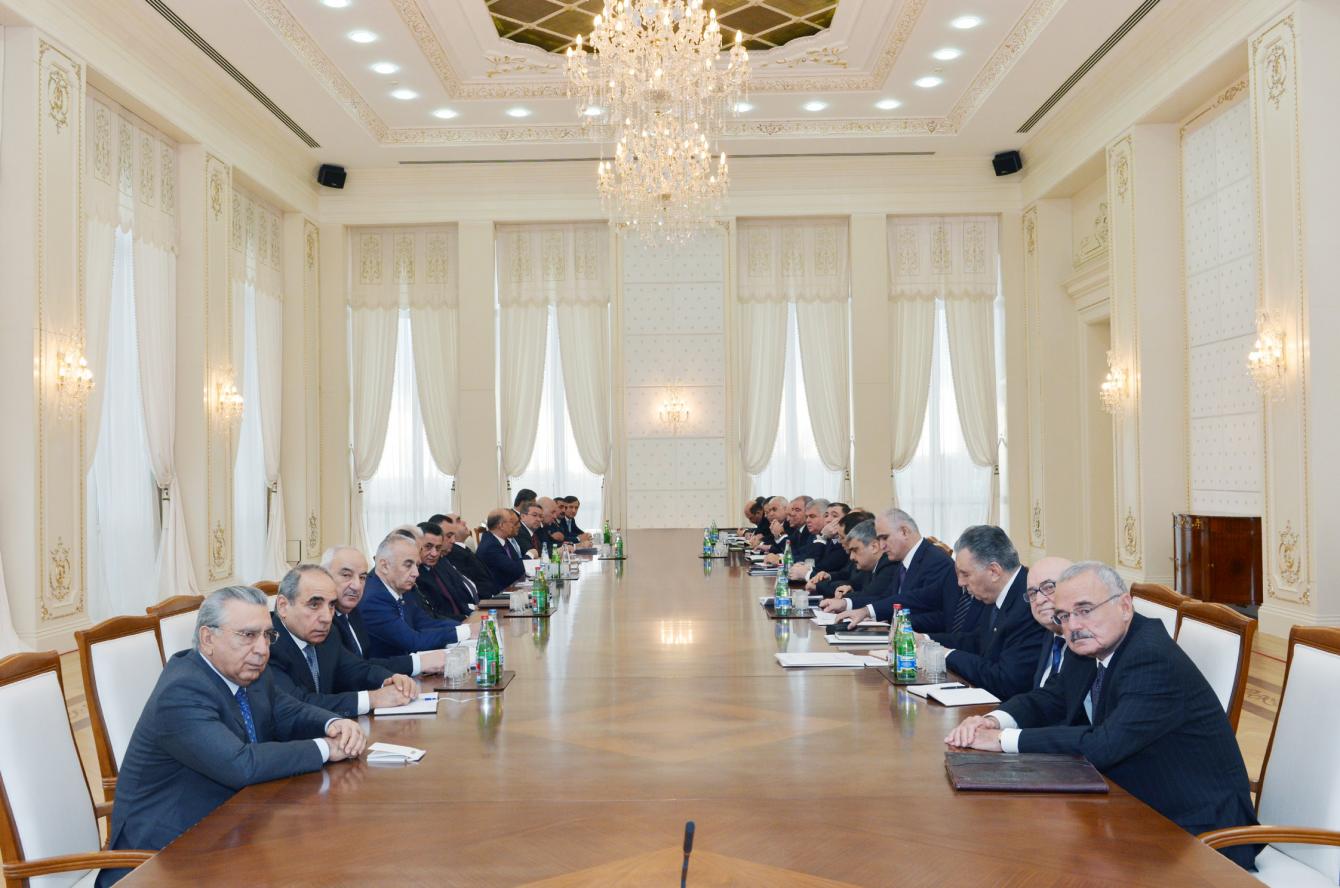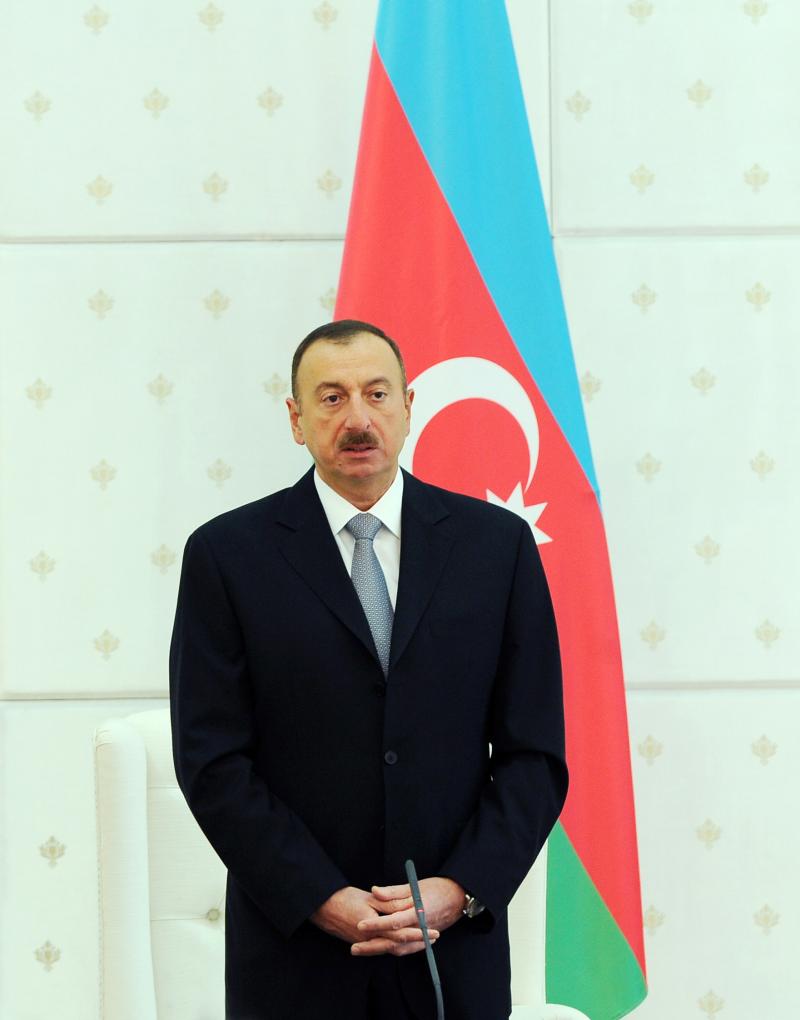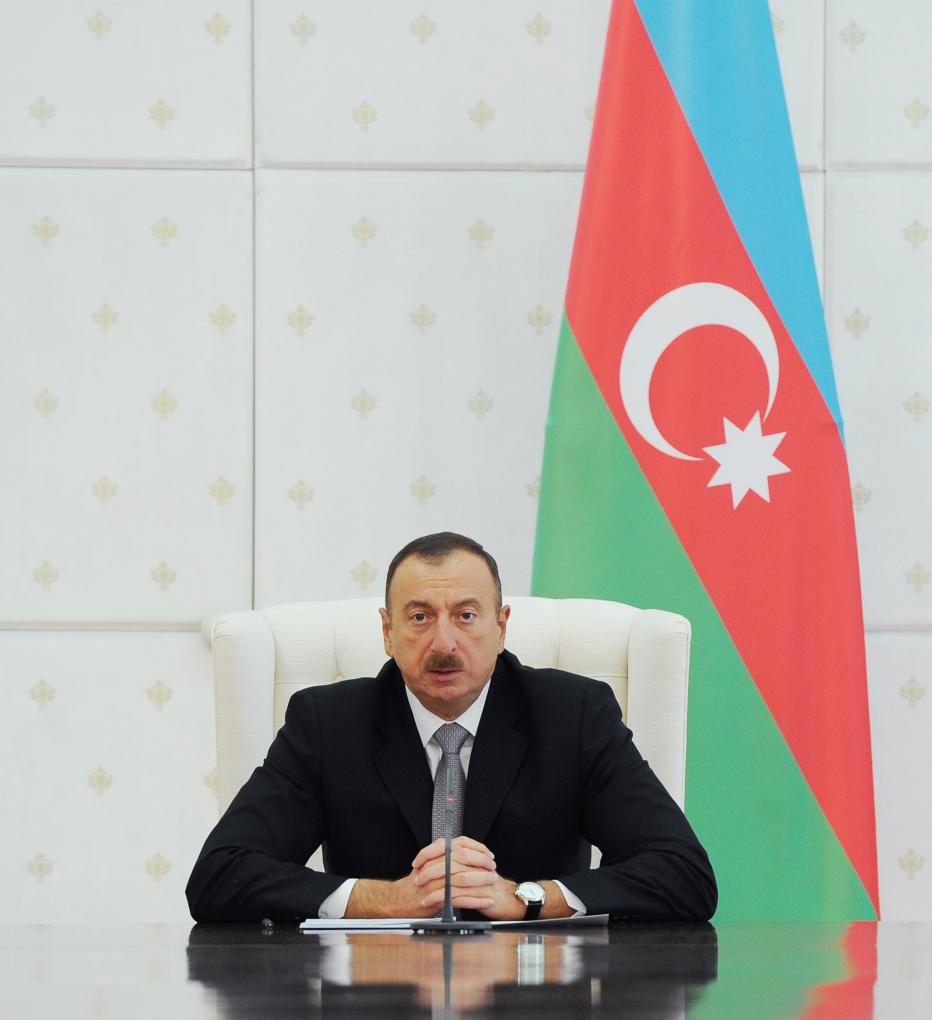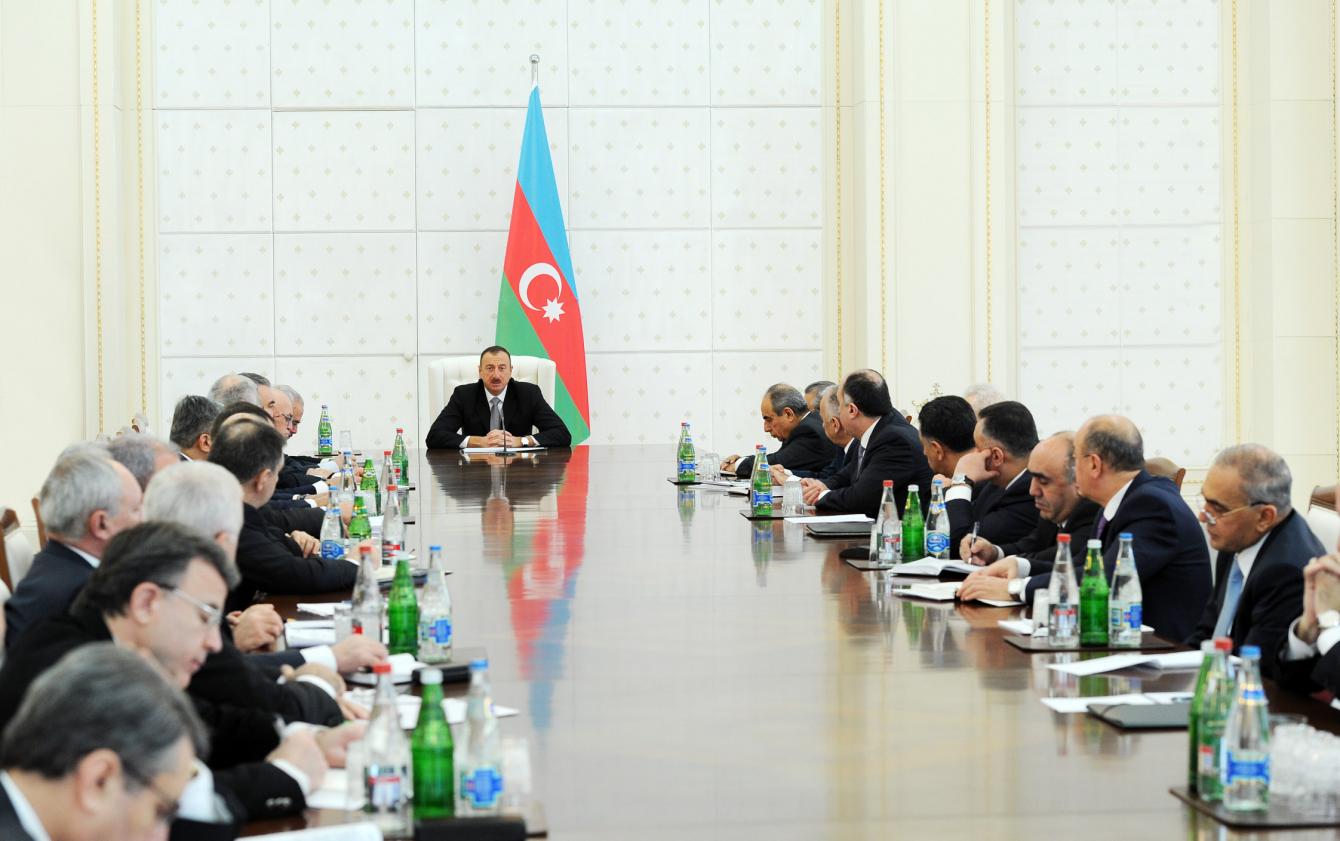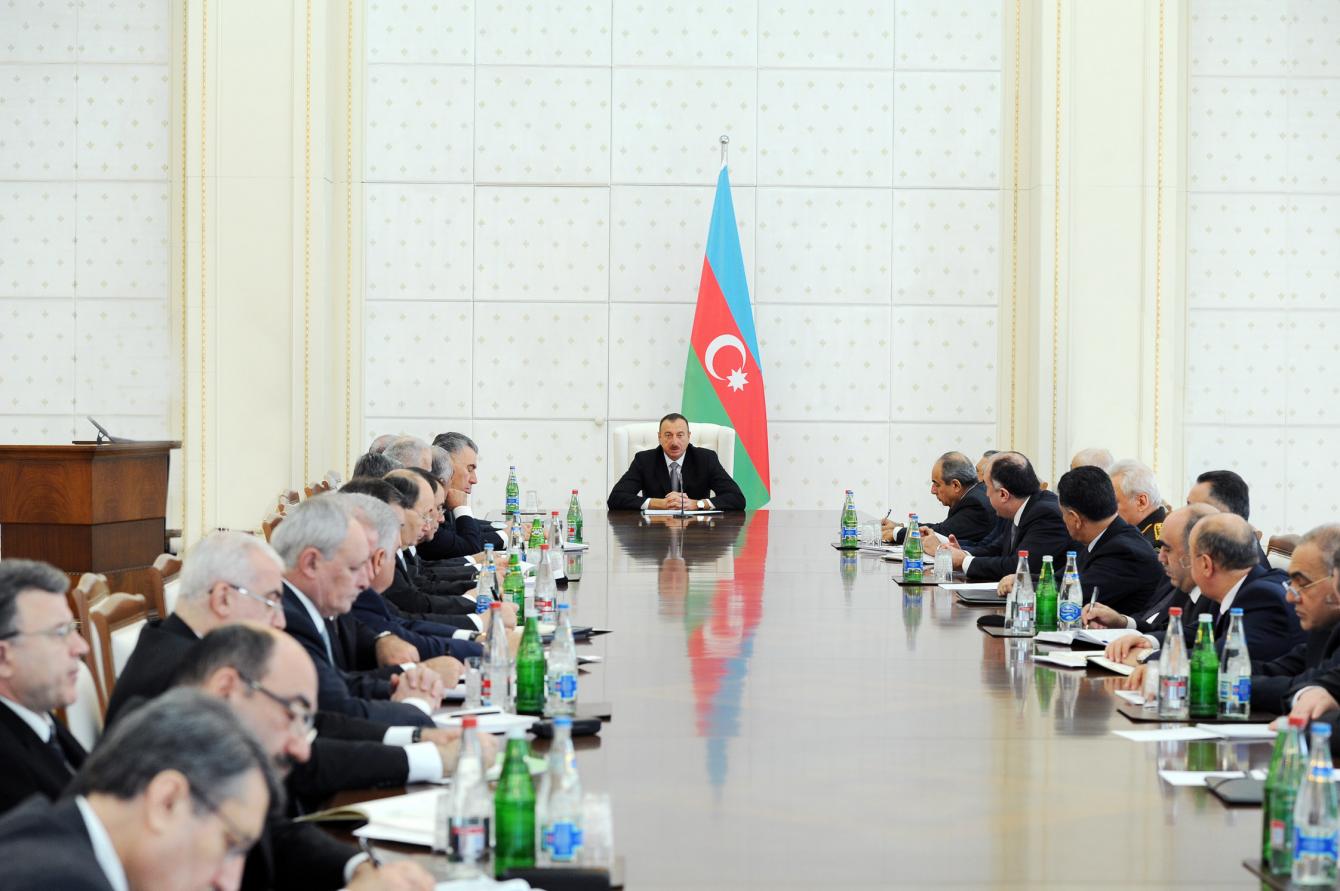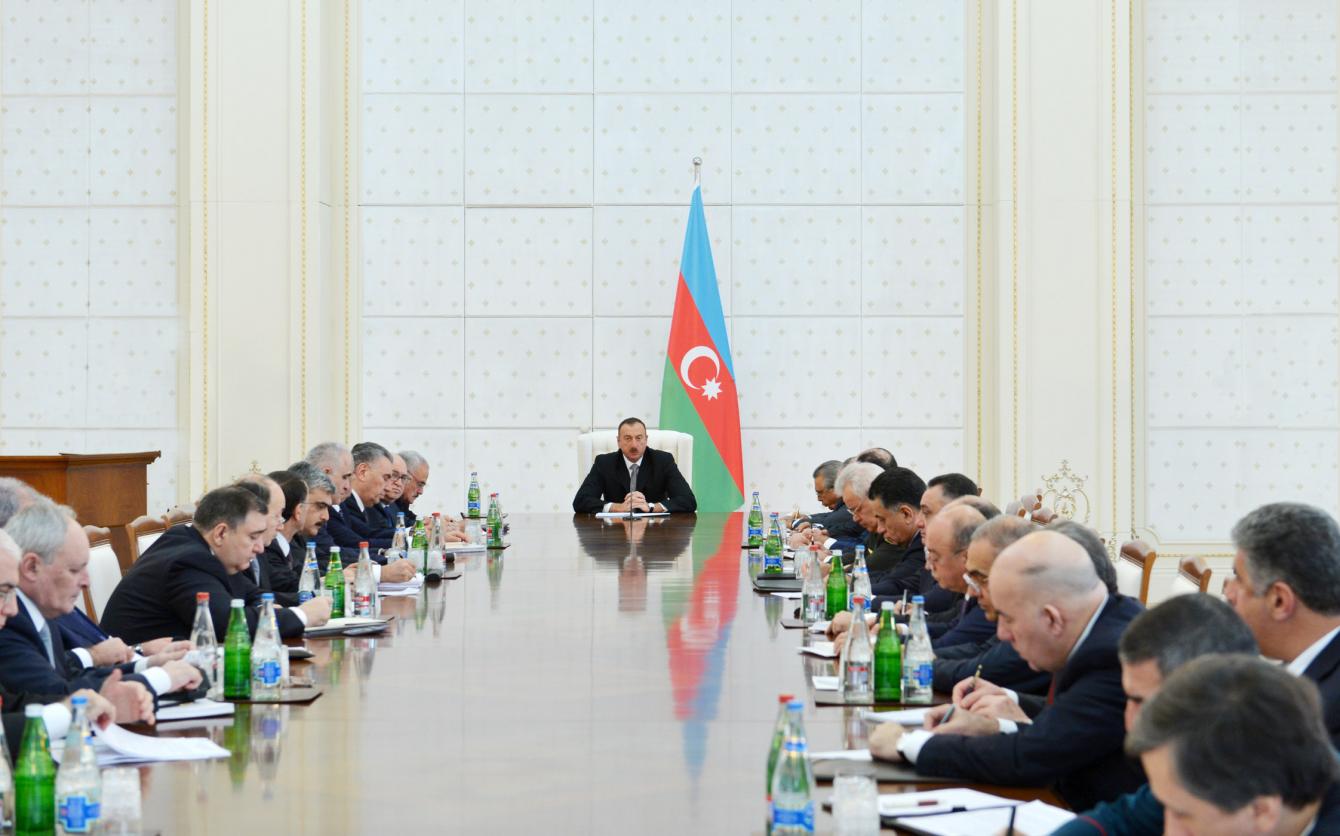President Ilham Aliyev has chaired a meeting of the Cabinet of Ministers of the Republic of Azerbaijan dedicated to the results of socioeconomic development in 2012 and objectives for 2013.
The President made opening remarks at the meeting.
Opening remarks by President Ilham Aliyev
- At this meeting of the Cabinet of Ministers we will discuss the results of 2012 and at the same time analyze the objectives for 2013. There is a great need for that, because our economy maintained its rapid development last year, and I am sure that the work to be done this year will lead our country to even greater achievements. This year ends our 10-year development plan, which was defined in 2003. In early 2004, we adopted a program on the development of districts, and its second phase will be completed this year. I am sure that before the end of the year all the objectives set in the program will be met.
Overall, last year was very successful for the country's economy. It is not surprising because the foundation of last year’s success was laid in the previous period. Our sound economic policy is already yielding excellent results, there is positive dynamics and our development is very gratifying. Indeed, we had no doubt as to the outcome of the year even in early 2012. Early last year I expressed my confidence that 2012 would also be successful. And so it happened. All our economic indicators are at a high level. The gross domestic product grew by 2.2 percent. This is a very high indicator for developed countries, especially in the crisis years. Of course, since our development rate was higher in previous years, this is not very good for us. But if we consider that there was a reduction in oil production and industrial production decreased by a total of 2.3 per cent last year, the GDP growth by 2.2 per cent is a very positive indicator.
But the most gratifying fact is that we have achieved this growth due to the non-oil sector. Last year our non-oil sector grew by 9.7 per cent. Thus, we have met the goal of diversifying the economy which we set a few years ago.
Our non-oil industry is also growing. It is also a testimony to the fact that our policy of industrialization has been correct in recent years. Our non-oil industry grew by almost 8 per cent, agriculture by about 6 per cent. The macroeconomic situation is very positive. Inflation is only at 1.1 per cent. This is the lowest level in recent years. Personal incomes have increased by 13.8 per cent. So the difference between inflation and incomes is more than 10 per cent. This, I believe, is also one of the best indicators worldwide.
It is no so easy to keep inflation at a low level. We should remember that major social programs were implemented last year. They include the initiative to pay our citizens compensation for their Soviet deposits. The government has already paid hundreds of millions of mantas in compensation. This inevitably became an additional burden on the macroeconomic situation. At the same time, last year’s investment reached record levels. According to official statistics, investment exceeded $22 billion last year. Of these, 13 billion, even a little more, was domestic and about $9 billion foreign. This is also a very positive indicator. First of all, it shows that domestic investment has been dominating the overall investment portfolio for several years. On the other hand, $9 billion of foreign investment shows that Azerbaijan is a reliable partner and a very attractive country for foreign investors. The economic reforms carried out in our country, the economic liberalization, our policy towards integration into the world economy have fetched foreign investment of nearly $9 billion. Of course, an important role in this respect is also played by the ratings of international credit agencies. Last year, the world’s leading credit agencies upgraded the credit rating of Azerbaijan. And I can say that this is a very rare phenomenon in the modern world, because the ratings of some developed countries are reducing, while the credit ratings of Azerbaijan are rising, which is the result of the economic reform.
In general, our economy is assessed well by other reputable international organizations too. World Bank reports rank Azerbaijan highly in terms of doing business. According to the Davos World Economic Forum, the Azerbaijani economy is in 46th place in the world and first in the CIS for competitiveness. This is the result of the work done, and we certainly see this positive trend in daily life. Our financial capabilities are growing. This year’s budget is also at record levels, about 20 billion manats will be expended. Last year we managed to increase our foreign exchange reserves even though the costs were quite high. Currently, our total exchange reserves are at $46 billion. This is a very large amount. I think it is a very high figure on a global scale too. In some cases foreign exchange reserves are compared to the gross domestic product of a country, and I believe that by this indicator we are in one of the leading positions. Our foreign exchange reserves account for 70 per cent of the GDP. So our economic stability – of course, economic stability rests on a solid political stability – infrastructure projects, social programs and our activities in other areas have produced excellent results in 2012.
As for social issues, I want to point out again that last year we started a program on the repayment of compensations for the deposits which remained "frozen" for many years, since Soviet times. According to information provided to me at the end of last year, most of the program has already been implemented. Citizens have received funds amounting to hundreds of millions of mantas. I am sure that this program will be completed in the coming months. We planned to complete the program by the end of this year. It was a major political step which shows how judicious our social policies are. It also shows that citizens of Azerbaijan and their welfare are at the center of everything we do.
Other social programs were also implemented last year. More funds will be envisaged for this purpose this year. So I am sure that our social policies are going to be very effective this year too. At the same time, a lot was done to improve the social infrastructure last year - hundreds of schools, hospitals, Olympic centers and other social facilities were built and repaired.
Such projects are also envisaged in the investment program for this year. Last year, the State Oil Fund allocated the largest amount ever for improving the plight of the internally displaced persons – 300 million manats was allocated. This is the biggest amount in our history. These funds were spent on building new apartments and houses for over 20,000 displaced people. These homes were built at top level and meet the highest standards. I personally attended most of the opening ceremonies and saw that the conditions for the IDPs are topnotch. And this should be the case. The IDPs deserve that. The State Oil Fund has envisaged the same level of funding for this year. At least another 20,000 IDPs will be provided with new houses and apartments this year. We may allocate additional funds to this area during the year, because, as I said, our financial situation is good. The 300 million manats allocated on an annual basis is a very large amount. In essence, we will create a whole city within the year.
The program on the development of districts has also been successful. As I said, the first program was adopted in 2004 and the second in 2009. The second program is nearing completion. All the goals have been met. A total of 117,000 jobs were created last year, including 93,000 permanent ones. Since the start of the program, 1.2 million jobs have been created, which, in turn, contributed a lot to reducing unemployment. In 2012, unemployment decreased further to 5.2 per cent. Poverty, which is directly linked to unemployment, has also declined from 7.6 to 6 per cent. This, I think, is an excellent indicator even for developed countries.
As a result of the work planned for 2013 and the implementation of new infrastructure projects and social programs, I am sure that poverty will further reduce. Therefore, the task of completely eliminating poverty in Azerbaijan, which we set 10 years ago, will be fulfilled.
The program on the development of Baku and its suburban settlements has also been successfully executed. A lot has been done. The program should be completed this year. Infrastructure projects are ongoing in all suburban settlements, roads are built and modern conditions created. The implementation of this program is under constant review, and I am sure that key infrastructure and social problems of suburban settlements will be resolved by the end of this year. We have a comprehensive approach to this issue. The program is very detailed, broad and precise. It provides for everything – water, gas, electricity, roads, schools, medical institutions, etc. As a result of this program, we will eliminate the vast majority of problems in suburban settlements.
Residents and business people from suburban settlements have already started receiving loans from the National Fund on Entrepreneurship Support. A lot has also been done to create jobs in suburban settlements. A large number of new businesses were established last year. Of course, this has had a positive impact on the elimination of unemployment.
Last year was quite remarkable in terms of industrialization. A lot has been done both to establish major industrial enterprises and develop small and medium-sized enterprise. The volume of loans granted to entrepreneurs is growing and will continue to grow this year. This is a great contribution to the real economy and, at the same time, a manifestation of our policy towards entrepreneurship and private sector development.
We have successfully resolved food security issues. The increase of agricultural production by about 6 per cent, of course, is the result of the work done. We will talk about that, we have specific proposals for 2013.
2012 was very successful in terms of foreign policy. We have expanded our foreign activities and succeeded in meeting our goals in international organizations. Last year, Azerbaijan presided over the UN Security Council for the first time in its history. This is a historic achievement. Overall, our election to the Security Council in late 2011was a historic event and an indication of Azerbaijan’s international authority. Last year we successfully presided over the world’s number one organization. Of course, our international reputation and footprint have enhanced. I can say that we further asserted ourselves in the world last year. I am very glad that Azerbaijan has justified the trust placed in us by the international community in 2011. I think this confidence grew even more over the year. Of course, we were elected to this authoritative body due to our international credibility. During the year, we were able to justify this confidence.
Azerbaijan is a reliable partner and has its own position on all issues. Our position is fair and based on international law. I believe that the number of countries supporting us in the UN has increased in the course of one year.
At the same time, international organizations passed very important decisions aimed at resolving the Nagorno-Karabakh conflict last year. Among them, I want to highlight the final declaration of the Non-Aligned Movement summit. The Non-Aligned Movement includes most countries of the world, and Azerbaijan has joined the organization recently. Despite this, the first summit we have participated in adopted a very serious resolution on the Nagorno-Karabakh conflict. It is based on justice and international law. It also indicates that the conflict must be resolved only within the territorial integrity of countries. I believe that it is our great political and diplomatic success. It further reinforces the resolutions adopted by other international organizations earlier.
A similar resolution was passed by the NATO summit last year. It also states that the Armenian-Azerbaijani Nagorno-Karabakh conflict should be resolved on the basis of territorial integrity. The Non-Aligned Movement and NATO include most countries of the world, so the position of the international community is unequivocal. It is a fair position based on international law. We will not back down a step from this position. At present, the negotiations on Nagorno-Karabakh are in a "frozen" state due to Armenia’s unconstructive approach. But there are principles we will never retreat from. This issue must be resolved only within the territorial integrity of Azerbaijan. The occupying forces must withdraw from all occupied lands. Of course, diplomatic and political aspects reinforce our position. Our position is unshakable both from legal and political standpoints.
At the same time, our economic and military power is also at the required level. We are building it up. I am sure that the forces in Armenia which approach the issue realistically are well aware that this conflict and competition with Azerbaijan do not promise them anything good. Conversely, they are gradually losing this fight. The developments unfolding in the international plane, within the framework of international organizations, and in the region are strengthening our position.
Today, Azerbaijan is a strong economy. We have a bright future, while Armenia's economy is in decline. I have repeatedly said this and want to repeat that the future of this country is in serious doubt. They have become victim of their own expansionist policy. As long as the conflict remains unresolved, they will go from bad to worse. We, in turn, must use every opportunity to squeeze out Armenia in the future. We have already isolated them from all projects. This policy will be continued. We will use every opportunity to achieve this. We can and, if necessary, will engage political, diplomatic, economic and military capabilities.
As for army building, I can say that a lot was done in this direction last year. Major steps were taken to strengthen our army, large volumes of equipment and ammunition were purchased and an infrastructure created. Our total military spending exceeded $3 billion last year. Our total military costs in this year's budget are at $3.7 billion. For comparison, Armenia’s total budget is less than $2 billion. Of course, this creates new opportunities for us, and we will use them.
In the issue of army building, it is not only logistics but also the professionalism and discipline that matter. Both professionalism and discipline should be reinforced. Army is a part of society. The citizens serving in the army are part of our society. As in any other field, there may be errors and shortcomings in the army. But the most important thing is that these mistakes and shortcomings should be identified in a timely manner, and the government is taking serious measures to do that. We will continue to implement policies aimed at strengthening the material and technical infrastructure of our army and bolstering professionalism and discipline. Today our army is the leading military force in the South Caucasus. Our army has achieved a lot. We will never allow anti-national elements to tarnish our army and cast a shadow on its reputation. We will never allow that. As Commander-in-Chief, I will never allow that to happen. The people of Azerbaijan will never allow it either, they will give an adequate response to those trying to cast aspersions on our army.
In the past year we also achieved a lot in the energy sector. Through the implementation of the new oil strategy laid down by great leader Heydar Aliyev, we have become a serious energy nation on a global scale. Our oil and gas projects, oil and gas pipelines have turned Azerbaijan into a truly important producer and exporter of oil and gas.
In continuation of this policy, a very important and I would say a historic event took place last year – we laid the foundation of the TANAP project. The project was initiated by Azerbaijan. We have also assumed the biggest financial burden. Besides, Azerbaijan has assumed all the risks, all technical risks. It is safe to say we have initiated all the projects ongoing in the region. We initiated the construction and rehabilitation of the Baku-Tbilisi-Ceyhan, Baku-Supsa and Baku-Novorossiysk pipelines. We initiated the Baku-Tbilisi-Erzurum gas pipeline project. The TANAP project was also initiated by Azerbaijan. Our leadership in this area has produced excellent results. We are not just developing our country, our development also has a positive impact on the region and contributes to the energy security of Europe. It is no coincidence that the documents signed between the European Union and Azerbaijan describe Azerbaijan as a very important and crucial partner in this area.
The initiation of the TANAP project was a very serious step on our part. I am very happy that TANAP has received great support in the world in a short time. Leading countries have explicitly supported our initiative. International organizations have also supported our position.
The TANAP project is perceived in a regional framework. I am very glad that together with partner countries we are now taking specific measures to implement the project. Additional measures will be taken in 2013. This project will facilitate our long-term development. The Baku-Tbilisi-Ceyhan pipeline had also been introduced by great leader Heydar Aliyev as a project that would lead Azerbaijan forward. Today we are seeing great results of that. TANAP will be a very effective means of providing for economic and indeed other interests of Azerbaijan for decades. We have a strong will to realize this project. First of all, it is a pressing issue. At the same time, we have the technical capacity. We have the financial capabilities which we acquired by implementing earlier projects. Our fruitful cooperation with international financial institutions is expanding and already has a wonderful history. Today, financial institutions are perhaps competing with each other to provide loans to Azerbaijan. Today, we can take loans in any amount and on the most competitive terms. In fact, I have told the government to slightly reduce the number of loans in order to avoid the accumulation of a large public debt.
Our public debt accounts for only 7-8 per cent of the GDP, which is a rare indicator worldwide. So our work in the energy sector is quite dynamic. I want to repeat that the gist of our economic policy is to diversify the economy and achieve greater development of the non-oil sector. At the same time, the solution of energy issues, our regional projects related to the production of oil and gas are constantly in the spotlight.
I am very glad that the international energy family also knows Azerbaijan on the positive side and believes in us as a reliable partner. At the same time, we say our word when necessary. Because I believe that in all areas, both in politics and in economic cooperation, people and states should be sincere and express their position. If there is a worrying issue, we should not gloss over it but, on the contrary, identify it and take action.
I am very glad that the concern over production of oil which I expressed at a Cabinet meeting some time ago was properly understood by our partners. And I can say that as a result of the measures taken, oil production will stabilize in 2013. We have achieved this as a result of talks with bp. I am very pleased that mutual understanding between bp and SOCAR has been restored, and today these ties, which have a long history, are entering into a new phase. There is a lot to do in the future. The implementation of the Shah Deniz-2 project, maintaining oil production at a stable level for many years to come, regional projects, the TANAP and other projects are strengthening our cooperation. I want to reiterate that we should and do openly discuss both positive and disturbing issues. The main issues are resolved through daily hard work. I think this is the right approach because we need to value our partners. If we see a positive response from them, of course, this makes us happy and creates favorable conditions for continued cooperation.
Of course, I can not cover all the work done in 2012 in one speech. But I have tried to highlight the main issues. Today we will discuss the results and, more importantly, talk about the plans for this year.

